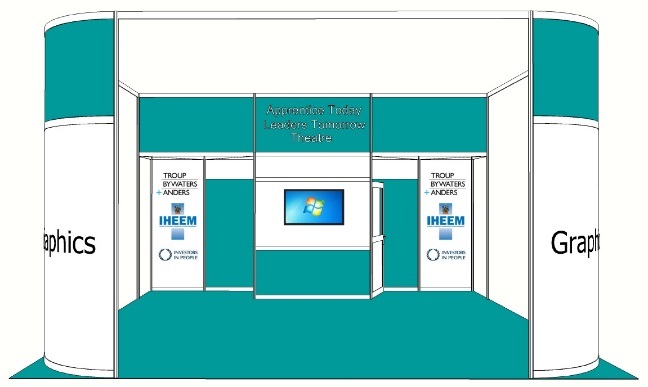The key themes of this year’s IHEEM Conference, to be held alongside the Healthcare Estates exhibition, are governance and assurance, cost saving, efficiency, patient care, and the patient experience.
With accountability and fire safety also very topical at the moment; the conference programme aims to cover all key areas affecting estates and facilities professionals both now, and in the future.
Strategy and leadership; estates and facilities management; planning, design and construction; are the cornerstones around which the conference is based.
The talks are arranged into hour-long modules to enable delegates to plan their programme, and new for 2017 NHS employees will be able to book individual modules to attend.
Day One opens with Simon Corben, director and head of profession at NHS Estates and Facilities at NHS Improvement, who will discuss the need for clearer corporate governance and assurance, as well as reflecting on his first six months in office.
A panel discussion will follow, picking up the governance and assurance theme and representing the professional perspective of a hospital trust and the parallel experience of an institution in higher education.
Moderated by IHEEM president, Pete Sellars, panellists joining Corben include will include Kevin Oxley, head of estates and facilities at County Durham and Darlington Acute NHS Trust; and Paul Kingsmore, director of services at Manchester Metropolitan University.
Day Two will open with Lord O'Shaughnessy, who advised the former Prime Minister from 2010-2011. David Cameron’s former Downing Street policy chief was recently appointed as a minister at the Department of Health in Theresa May’s recent reshuffle.
Lord O'Shaughnessy replaced Lord Brampton as a minister for NHS Productivity and, as Parliamentary Under Secretary of State for Health, he will lead on a range of policy areas which includes responsibility for NHS Property Services and Community Health Partnerships which covers NHS procurement, NHS security management, and estates and facilities.

Lord O'Shaughnessy has been announced as the Day Two keynote speaker
The three streams at this year’s conference give attendees a chance to hear from experts - those who have experienced the changes required to improve the NHS – and to meet and ask questions of experts in their field.
Architects for Health will present a number of case studies in the Planning Design and Construction stream, demonstrating the case for appropriate, thoughtful design for healthcare buildings with very different uses; a multi-purpose healthcare facility used as a community space as well as a place of treatment; a combined research establishment and hospital facility, bringing medical research closer to patient treatment for the benefit of future generations; the best in design for mental health treatment; and a modern hospital development – a stark contrast to the 1960s building that it replaces.
The importance of apprentices in the longevity of healthcare engineering is a theme of Healthcare Estates as a whole this year, following the focus shone on this important legacy subject by the Sellars.
And the Apprentices theatre within the exhibition, and a workshop for apprentices in the conference, will provide information and encouragement from professionals who were themselves apprentices, and a new perspective on a career.

An Apprentices Theatre will be located within the exhibition
Strategy and Leadership looks at the bigger picture: Modern-day management of the NHS estate and the most-appropriate metrics to be able to do this, as well as meeting cost and efficiency savings targets; acquisitions and mergers; and rationalising estates.
Engineering and Facilities Management will consider safety and accountability in fire prevention, as well as practical aspects of estates management, including energy procurement, the sustainability of facility management practices, the measurable impact of a building on the occupants’ health, the perennial bugbear of parking on hospital sites, and incremental improvements that can improve a site’s car parking efficiency and access.
In addition to the expert contribution of Architects for Health; the role of buildings in dementia care and looking after an elderly population by adapting environments will be considered, together with optimising the efficiency and experience of accident and emergency departments, particularly for children.
And modular building as a high-quality quick fix for additional treatment space will also be discussed using case studies and making a case for this system as the way forward in creating durable, flexible facilities with minimal disruption to existing services.
The conference will run alongside the exhibition, which this year sees over 220 companies demonstrating the latest technologies, products and services.
The exhibition also features product demonstrations and discussions in six theatres, including two new theatres devoted to Apprentices and Facilities Management.
Other theatres will focus on areas including Water & Infection Control; Healthcare Design; and Energy and Sustainability.
Victoria Emerton, conference director, said: “We have a great mix of case studies at this year’s conference, with some fantastic speakers working directly within the NHS innovating and improving the NHS.
“With so much content and two days of invaluable networking; the conference offers real value for money for those working hard to improve their trusts performance.
“With the added benefit of six theatres on the exhibition floor offering free content; the event is a wonderful opportunity to catch up with the latest developments and speak to colleagues in the industry about the solutions available.
Full details of the programme can be found on the event website at www.healthcare-estates.com
